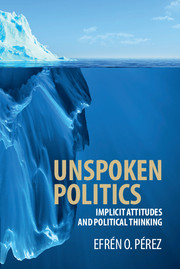Book contents
- Frontmatter
- Contents
- List of Tables and Figures
- Acknowledgments
- 1 Implicit Thoughts, Explicit Decisions
- 2 Two Ways of Thinking, Two Types of Attitudes
- 3 Implicit Expectations and Explicit Political Reasoning
- 4 Ghost in the Associative Machine
- 5 Unstated: The Measurement of Implicit Attitudes
- 6 Incognito: The Subconscious Nature of Implicit Expectations
- 7 In Deliberation's Shadow: Education, (Un)awareness, and Implicit Attitudes
- 8 In Black and White: Race, Group Position, and Implicit Attitudes in Politics
- 9 Conclusion: Implicit Attitudes and Explicit Politics
- Note on the Studies
- References
- Index
- Books in the series
4 - Ghost in the Associative Machine
Published online by Cambridge University Press: 05 March 2016
- Frontmatter
- Contents
- List of Tables and Figures
- Acknowledgments
- 1 Implicit Thoughts, Explicit Decisions
- 2 Two Ways of Thinking, Two Types of Attitudes
- 3 Implicit Expectations and Explicit Political Reasoning
- 4 Ghost in the Associative Machine
- 5 Unstated: The Measurement of Implicit Attitudes
- 6 Incognito: The Subconscious Nature of Implicit Expectations
- 7 In Deliberation's Shadow: Education, (Un)awareness, and Implicit Attitudes
- 8 In Black and White: Race, Group Position, and Implicit Attitudes in Politics
- 9 Conclusion: Implicit Attitudes and Explicit Politics
- Note on the Studies
- References
- Index
- Books in the series
Summary
…[N]ews stories inevitably select only some aspects of reality and leave out others. More important, over time, the specific realities depicted in single stories may accumulate to form a summary message that distorts social reality.
– Robert Entman (1994)I have argued that associative reasoning enables citizens to develop implicit attitudes on the basis of recurring patterns in political discourse that surrounds policy issues. This claim is informed by several experiments in controlled laboratory settings that suggest an interplay between the valence of information surrounding an object and the development of implicit attitudes toward the object on the basis of this information (e.g., De Houwer et al. 1997; Gawronski et al. 2014a; Gregg et al. 2006; Olson and Fazio 2001, 2002; Rydell and McConnell 2006). In these controlled settings, subjects are experimentally exposed to repeated pairings of novel objects with positive or negative stimuli. Systematic exposure to these pairings, scholars have discovered, leads subjects to develop implicit attitudes toward novel objects in the evaluative direction of the pairings they encounter. Akin to Pavlov's dog, who learned to associate food with the ringing of a bell, people learn to implicitly associate an object with positive or negative affect, consistent with the accumulated information they encounter about the object. What is more, people develop implicit attitudes without retaining explicit memories for the information that promotes these evaluations (Olson and Fazio 2001). People also appear to form implicit attitudes without active control. Gawronski et al. (2014a), for example, have shown that explicitly instructing people to prevent (allow) patterned information from influencing their feelings toward a novel object leads individuals to reduce (increase) their self-reported attitude toward the object, but leaves their implicit attitude unaffected.
This classical conditioning hypothesis has become so influential, many scholars have concluded that implicit attitudes arise from the “accrual of information over time to form and strengthen associations in memory” (Rydell and McConnell 2006: 996; see also Gregg et al. 2006; Olson and Fazio 2002). In laboratory settings, however, the type and volume of information about objects is at researchers’ discretion. This level of control enables scholars to shed light on the psychological mechanisms behind the acquisition of implicit attitudes. Yet it also leaves scholars in the dark about actual information flows outside the lab, potentially undermining the external validity of the classical conditioning hypothesis (Shadish et al. 2002).
- Type
- Chapter
- Information
- Unspoken PoliticsImplicit Attitudes and Political Thinking, pp. 54 - 76Publisher: Cambridge University PressPrint publication year: 2016



